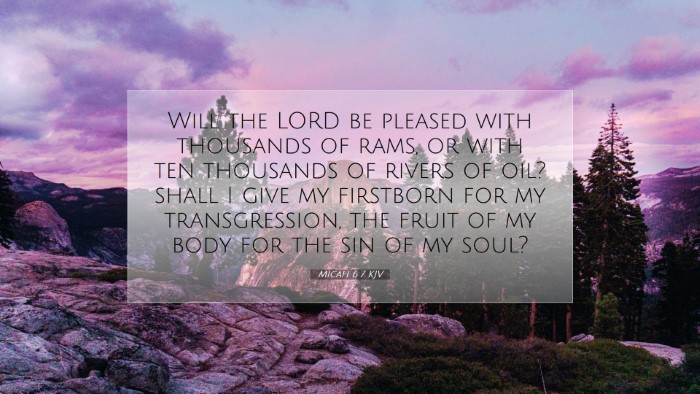Old Testament
Genesis Exodus Leviticus Numbers Deuteronomy Joshua Judges Ruth 1 Samuel 2 Samuel 1 Kings 2 Kings 1 Chronicles 2 Chronicles Ezra Nehemiah Esther Job Psalms Proverbs Ecclesiastes Song of Solomon Isaiah Jeremiah Lamentations Ezekiel Daniel Hosea Joel Amos Obadiah Jonah Micah Nahum Habakkuk Zephaniah Haggai Zechariah MalachiMicah 6:7
Micah 6:7 KJV
Will the LORD be pleased with thousands of rams, or with ten thousands of rivers of oil? shall I give my firstborn for my transgression, the fruit of my body for the sin of my soul?
Micah 6:7 Bible Commentary
Commentary on Micah 6:7
Verse Context: Micah 6:7 poses a question that reflects the concerns of the Israelites in maintaining their relationship with God. It reads: "Will the Lord be pleased with thousands of rams, with ten thousand rivers of oil? Shall I give my firstborn for my transgression, the fruit of my body for the sin of my soul?" This verse encapsulates the plea of the people who are searching for how to appease God amidst their shortcomings.
Exegesis and Analysis
Divine Expectations: Micah's rhetorical question implies that material offerings cannot satisfy God's requirements. Both Albert Barnes and Matthew Henry comment on the futility of mere ritual. They highlight that the question asks whether God values traditional sacrifices over sincere obedience. The emphasis is placed on understanding what God truly desires - a heart turned towards Him rather than outward expressions of worship that lack substance.
Commentary Insights
Matthew Henry's Perspective
According to Matthew Henry, the offerings mentioned—thousands of rams or rivers of oil—were among the most valuable sacrifices in the ancient Israelite culture. However, he notes that these material sacrifices do not equate to genuine repentance or moral conduct. He observes that the people of Israel were inclined to think that lavish offerings could substitute true loyalty to God. Henry argues that what God truly seeks is an authentic relationship characterized by humility and justice, not mere ritual compliance.
Albert Barnes's Interpretation
Albert Barnes expands on the notion of sacrificial offerings, suggesting that the mention of giving a firstborn reflects the extreme lengths to which some may go to appease God. Barnes emphasizes that while the Israelites believed in the power of sacrifices, God’s delight is not found in the number of offerings but in the heartfelt commitment and obedience of His people. He strongly states that God requires His people to act justly and love mercy, which reframes their understanding of worship.
Adam Clarke's Commentary
Adam Clarke provides a contextually rich interpretation, connecting Micah's prophecy with the broader narrative of Israel's disobedience. He posits that the desire to offer one’s firstborn is indicative of extreme desperation—a misguided attempt to achieve atonement. Clarke warns against the temptation to think that God can be placated with extravagant gifts. Instead, he insists that true sacrifice lies in a life dedicated to righteousness and social justice, which is highlighted in Micah 6:8.
Theological Implications
This passage importantly underscores several theological themes:
- God’s Sovereignty: The passage reveals that God transcends human conceptions of worship and sacrifice. He is not impressed by rituals devoid of meaning.
- Human Responsibility: It emphasizes that the burden of responsibility lies with humanity to pursue justice, love mercy, and walk humbly before God.
- True Worship: It challenges traditional views of worship by aligning true honor and reverence for God with moral living rather than ritualistic expressions alone.
Applications for Ministry and Scholarship
For pastors and theologians, Micah 6:7 serves as a significant reminder to encourage congregants toward authenticity in their faith. The verse's teachings can prompt vital discussions about the nature of worship, challenging believers to consider how their lives reflect their relationship with God versus mere participation in rituals. Students of theology can study this verse to explore the interplay of cultural practices and divine intention, examining how societal values shape worship practices over time.
Reflection Questions:
- In what ways do we attempt to 'buy' favor with God through our actions?
- How can congregations create spaces that foster genuine repentance and humility alongside traditional worship practices?
- What is our understanding of justice and mercy in light of God’s expectations for His people?
Conclusion
Micah 6:7 challenges all who read it to reconsider what they offer to God. Instead of searching for ways to appease Him through rituals, believers are called to embody the principles of justice, mercy, and humility. As highlighted by the insights from Henry, Barnes, and Clarke, the essence of worship is reflected not in abundance of offerings but in the quality of our hearts and actions.


